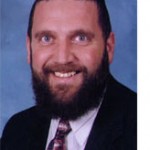By Rabbi Baruch Lederman

SAN DIEGO– In 1991, our three month old son Shlomo Moshe Lederman returned his soul to his creator. While we were sitting shiva, a number of people offered words of consolation. I found these words very inspiring. I wrote them down in a notebook (not a laptop, an actual paper notebook) along with my own thoughts and reflections.
Last week was a particularly tough time for us, as is every November, because it was Shlomo Moshe’s birthday. He was born in November 1990. On this, his recent birthday, I found myself thinking that he would be turning 22 if he were alive today. Sometimes I think about what he’d be doing now – where he would be up to – if only he didn’t die of SIDS. I often wonder what kind of person he would be, what his personality would be like. It was bitter and depressing. I recently received a correspondence from Rabbi Dovid Max, Richboro, PA, who was at the funeral 22 years ago, which gave me great consolation and strength:
Dear Rabbi Lederman: The scene of you being maspid (eulogizing) your son in front of the Yeshiva in Forest Hills, and then seeing you and your wife standing behind the station wagon with the tiny coffin inside, haunts me to this day.
If you don’t mind, I would like to share a thought with you that I just read yesterday from Rav Yaakov Kamenetsky zt”l on yesterday’s
Parsha that made me think of you.
The book Alainu Lishabeach from Rav Yitzchok Zilbershtein (son-in-law of Rav Elyashav zt”l) asks why does the Torah write “shnei
chayei Sarah”? It had already mentioned that Sarah’s life was one hundred years, twenty years and seven years so why repeat that
these were the years of Sarah’s life?
He brings from Reb Yaakov that the reason is because people had begun to say that the Akeida caused her death and if not for the
Akeida she might have lived for many more years, so therefore the Torah says no, these were the years of Sarah’s life, these were
the years allotted to her from the beginning. Her life span was not shortened by the Akeida.
When a child dies as an infant, the view is not that “what would have been had the baby lived longer” and the baby’s life was cut short. Because the baby did live the longest possible. From the beginning that was what the baby was set out to live for, and fulfilled its tafkid (purpose). Rabbi Dovid Max
Rabbi Max made me realize that I don’t need to fret over what my son is missing out on, or that he died because of anything that
anyone did. He is not missing anything, for he lived the time he was set to live, and fulfilled his mission on earth. He is now in Gan
Eden (the Garden of Eden) celebrating a life well lived. Thank you Rabbi Max, I am adding your beautiful words to my notebook.
Dedicated by Frank & Merril Felber on the occasion of the yahrtzeit of his mother Sarah bas Shmuel.
*
Rabbi Lederman is spiritual leader of Congregation Kehillas Torah in San Diego. He may be contacted at baruch.lederman@sdjewishworld.com